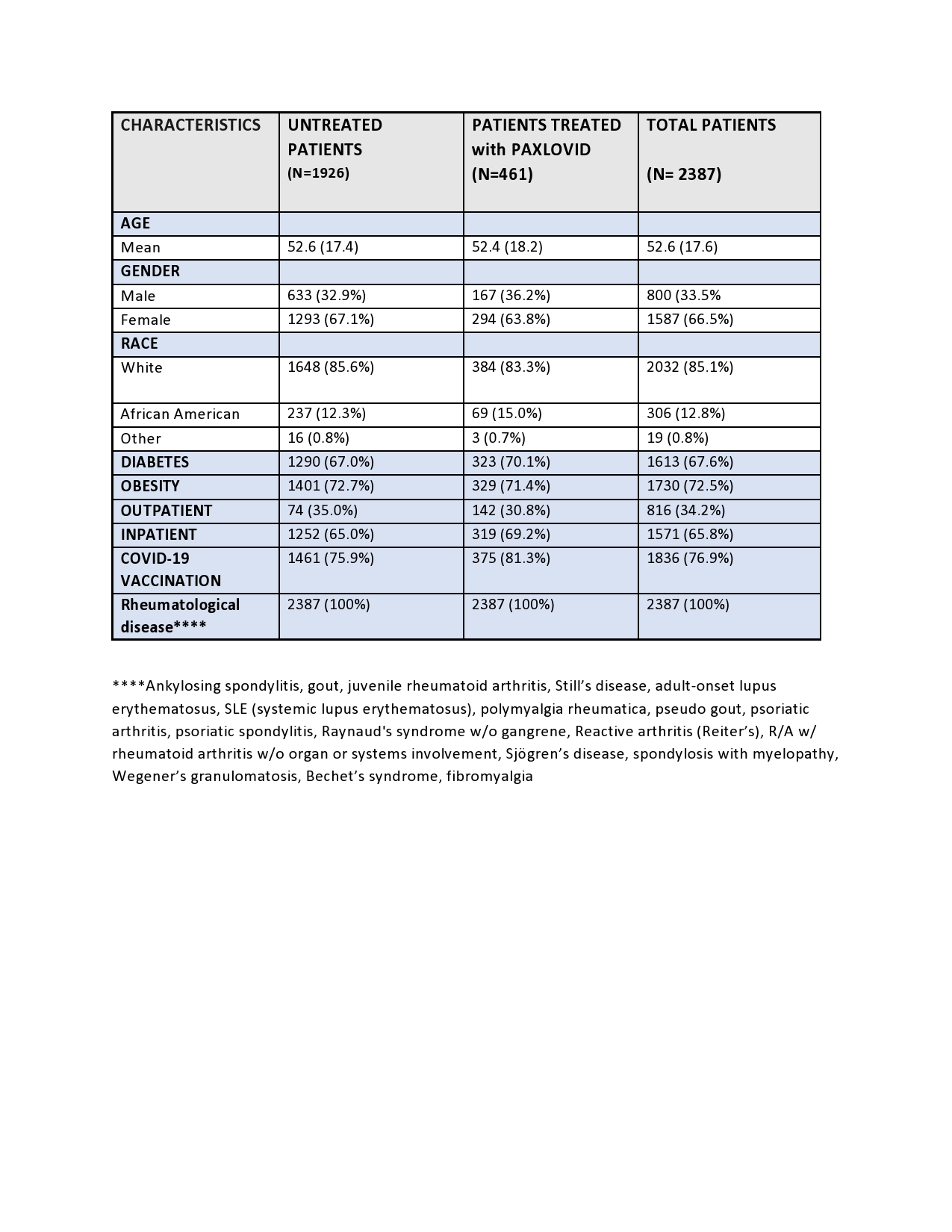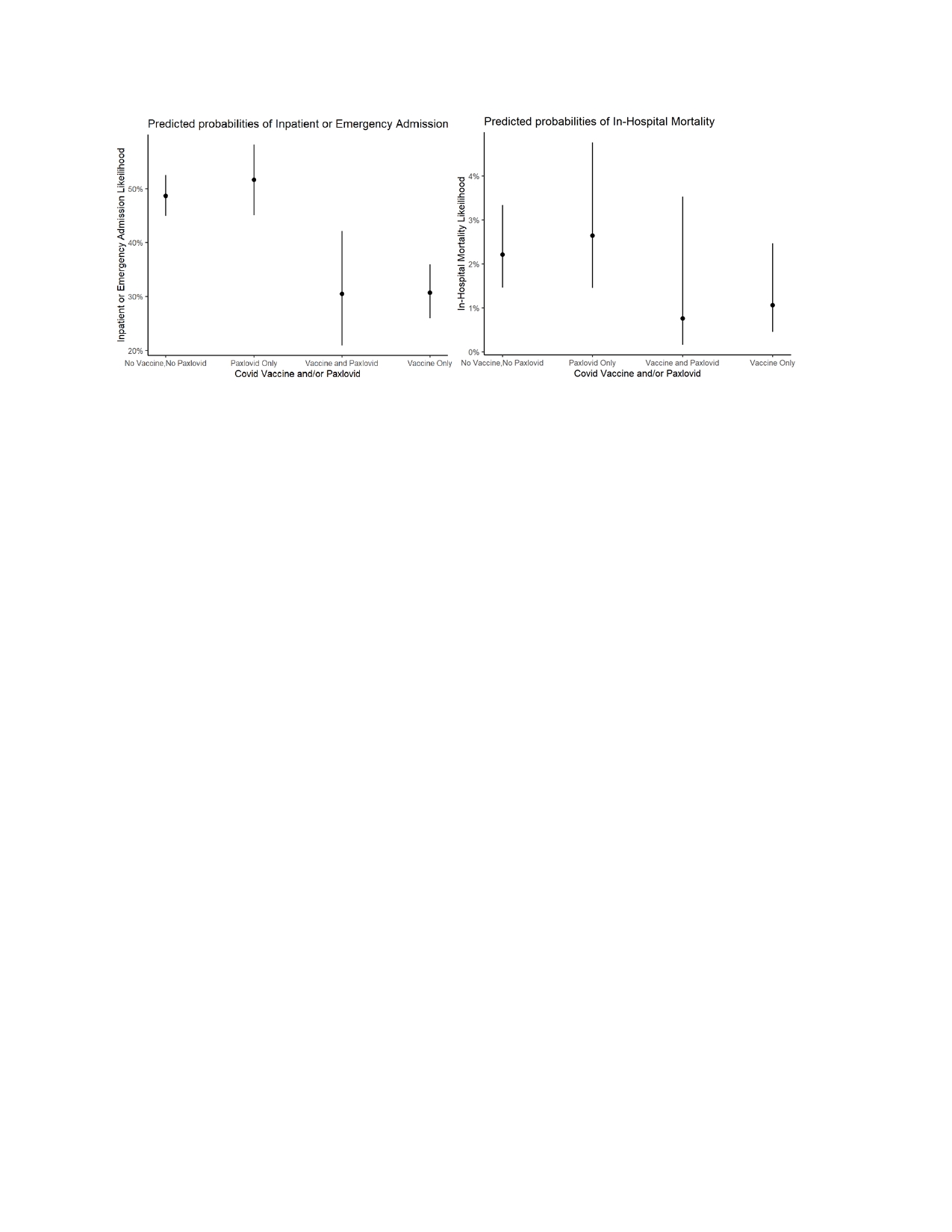Session Information
Session Type: Poster Session A
Session Time: 9:00AM-11:00AM
Background/Purpose: The benefits of antiviral therapy in the COVID-19 patients with underlying rheumatic disease with or without immunosuppression are not entirely clear. The goal of this study is to determine the utility of Paxlovid in patients with rheumatological diseases (inpatient and outpatient) in preventing COVID-19 associated hospital admissions and mortality. By preventing severe COVID-19 infection, we can potentially avoid any long-term breaks of immunosuppressive agents and disease flares in these patients.
Methods: This is an Institutional Review Board approved, retrospective study in which participants were identified as patients with diagnosis of a rheumatological condition based on ICD-9 and/or ICD-10 codes who presented to either the inpatient or outpatient setting at the University of Kentucky Hospitals between January 1, 2020, and September 30, 2022. Baseline characteristics of patients included in this study are shown in Table-1. Outcomes of interest were in-hospital mortality related to COVID-19 and inpatient or emergency admission due to COVID-19. All statistical tests were two-sided and statistical significance was defined as p-value < 0.05. All analyses were done in R programming language, version 4.1.0 (R Foundation for Statistical Computing, Vienna, Austria). For both outcomes, two logistic regression models were employed with odds ratios (OR) obtained. The first model considered patients’ Paxlovid prescription status conditional on their COVID-19 vaccine status. The second model considered patients’ Paxlovid prescription status conditional on their COVID-19 vaccine status while adjusting for prednisone prescription status, obesity, and diabetes diagnosis.
Results: A total of 2,387 patients were reviewed in this retrospective analysis (inpatient, outpatient including tele-medicine). All these patients had diagnosis of rheumatological diseases and COVID-19 based on ICD-09 and ICD-10 codes. COVID-19 vaccination was received by 1,836 patients (76.9%); only Paxlovid prescription was received by 461 patients (18%). Patients who received both COVID-19 vaccination and Paxlovid were 86 (3.6%). We discovered that Paxlovid used alone in unvaccinated recipients was associated with lowering the rate of hospitalization or emergency room visit but was not statistically significant (OR = 1.12; CI:0.86 – 1.48; p = 0.392). However, concomitant use of both Paxlovid and COVID–19 vaccination in patients was associated with a lower likelihood of hospitalization and emergency room visit (OR = 0.46; CI: 0.27 – 0.78; p = 0.004). Additionally, Paxlovid only was not found to be associated with reduced mortality related to COVID-19 (OR = 1.2; CI: 0.65 – 2.09; p = 0.535). Similarly, the use of Paxlovid in vaccinated patients suggested decreased mortality due to COVID-19 but was not significant (OR = 0.34; CI: 0.05 – 1.35; p = 0.185) (Figure 2).
Conclusion: This study demonstrates that Paxlovid provides protection in immunosuppressed patients with rheumatological diseases against severe COVID-19–associated outcomes resulting in emergency room visit and inpatient admission, significantly so in vaccinated individuals. Further studies are needed to investigate this within a larger patient population.
To cite this abstract in AMA style:
Javed F, Mangino T, Piranavan P. Paxlovid (Nirmatrelvir Plus Ritonavir) in Patients with Underlying Rheumatological Diseases, in Preventing COVID-19 Related Hospitalization and Death [abstract]. Arthritis Rheumatol. 2023; 75 (suppl 9). https://acrabstracts.org/abstract/paxlovid-nirmatrelvir-plus-ritonavir-in-patients-with-underlying-rheumatological-diseases-in-preventing-covid-19-related-hospitalization-and-death/. Accessed .« Back to ACR Convergence 2023
ACR Meeting Abstracts - https://acrabstracts.org/abstract/paxlovid-nirmatrelvir-plus-ritonavir-in-patients-with-underlying-rheumatological-diseases-in-preventing-covid-19-related-hospitalization-and-death/


